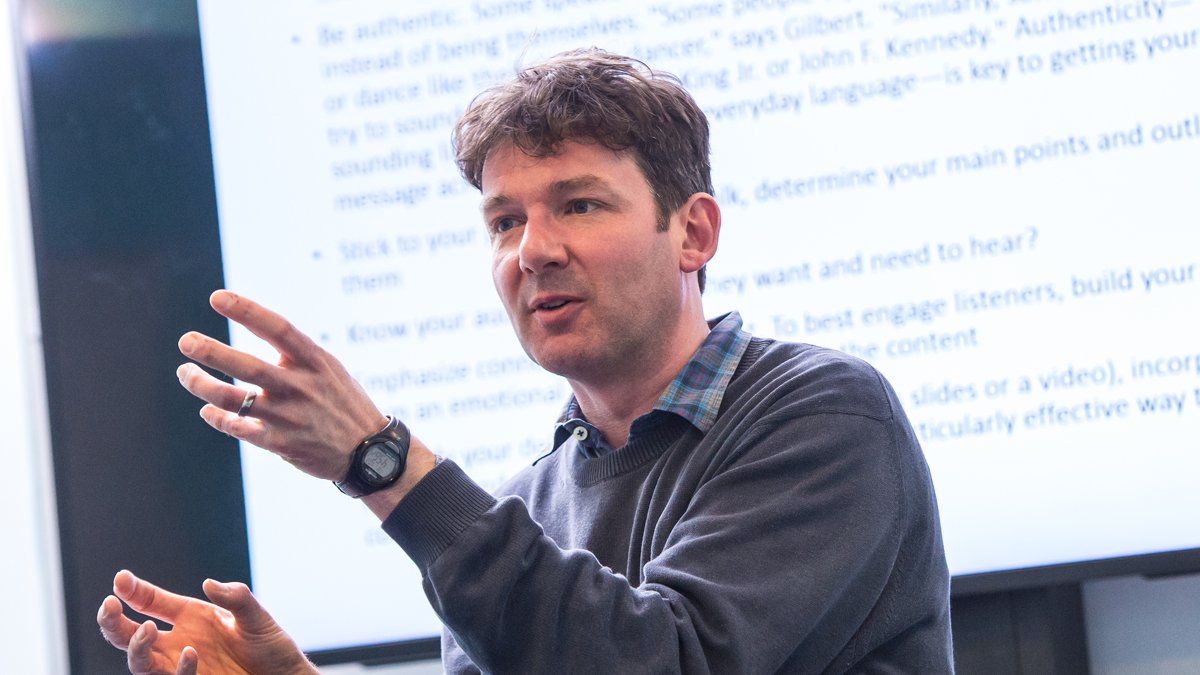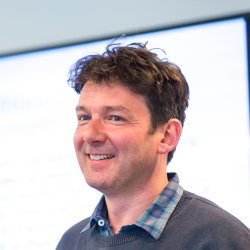Meet the academic: Dr Adrian Banks
Dr Adrian Banks, Senior Lecturer in Psychology, reveals what inspired him to get into the field, why you should study psychology and what he’s looking for in an undergraduate student.

"I first came to Surrey to study for my PhD, based on the recommendation of Professor Terence Lee, the first Head of the School of Psychology. I’m now a cognitive psychologist, passionate about research and teaching the next generation."
Why did you become a psychologist?
I’ve always been interested in how people think, their insights, and how they solve problems. I love Sherlock Holmes, House and so on.
When I was doing my A-levels, I came across a book with chapters from lots of different psychologists who worked on thinking and reasoning. This included a section on problem solving and described Duncker’s radiation problem – a classic experiment in the field, where a doctor has a patient with a malignant tumour that’s inoperable but can be treated by using other methods that will destroy both cancerous tissue and healthy. I thought this experiment was an incredibly ingenious way of working out how people solve problems.
I wasn’t exactly sure what I wanted to study at university, but I found these kinds of studies very intriguing and I was drawn towards a degree in psychology. I didn’t have a long-term career plan to be a psychologist and chose at each stage what seemed to be the most exciting opportunity available to me.
Once you graduated, what did you do?
My curiosity for applying psychology to help with decision making in practical situations continued to grow and I knew that I needed to spend time in those environments to understand them better. So, I did exactly that.
Some of the highlights were trying to stay awake during the night to test night shift workers on the London Underground, and completing training with the Royal Navy in their full-size simulation of a sinking ship that had to be repaired as it filled with water. There were also lots of other unusual experiences!
What excites you most about your current role?
Finding out something new is the most exciting part of my research. I spend weeks or months gathering data for a study and there’s a moment when I press the ‘button’ to run a statistical analysis and discover if my hypothesis is rejected or confirmed. That’s always a moment of nervous excitement. But if everything pans out, those little moments of discovery are truly indescribable.
In both my research and teaching roles, discussion is my favourite activity. This leads to creative ideas, rigorous analysis, further insight into the problem and lots of other benefits. It feels like you’ve figured something out and have a little more understanding of psychology than you did before.
What’s your area of expertise?
I’m interested in how people think and make decisions, in particular different types of intuitive thought and how they interact with deliberate thinking. It’s an important topic because so much of where we are and where we’re going is down to the decisions we make, big and small.
There’s a lot of unhelpful decision-making advice out there and an understanding of how we can think better can help in so many facets our lives.
Why should people study psychology?
Humans are endlessly complex and capable of great heights and have so much depth. This is what makes our behaviour so fascinating! Why do people behave as they do? How we respond to a situation isn’t random, it’s based on fundamental psychological principles. Psychologists are trying to find out what these principles are, to interpret and predict human behaviour, and this is what you’ll begin to learn as a psychology student.
You’ll also explore the process of examining psychological claims. Instead of believing nonsense explanations of humans that we hear all the time, you begin to question them. You’ll look at these claims and question if they’re real, examining the evidence, collecting more rigorous evidence, and developing more objective and accurate understanding of human behaviour.
If that’s something that interests you, then psychology is for you!
What are you looking for in a psychology student?
I’m looking for students who can have constructive arguments, backed by scientific research, who aren’t afraid to find creative and playful solutions to problems.
Do you have any advice for prospective students?
I’d suggest reading about psychology for interest and pleasure – whatever topic you’re into, from neuroscience to social relations. There are lots of excellent science books that cover all sorts of topics. Look for ones that are grounded in scientific literature (there’ll be references to psychological studies at the back). There are also lots of interesting documentaries, too, that can show you what it all looks like.
I wouldn’t recommend reading course textbooks simply to get a head start on your studies. They’ll be plenty of time for that! But don’t rule out academic texts by just assuming they’ll be unreadable. In the summer before my undergrad, I picked up a social psychology textbook from a second-hand book shop and read the whole thing and found it very interesting.
You’ll read beyond what is covered in your first-year exams in some areas and go down rabbit holes in others. But you’ll develop a much broader picture of psychology that will no doubt spark your interest and fuel your passion for further topics of study.
